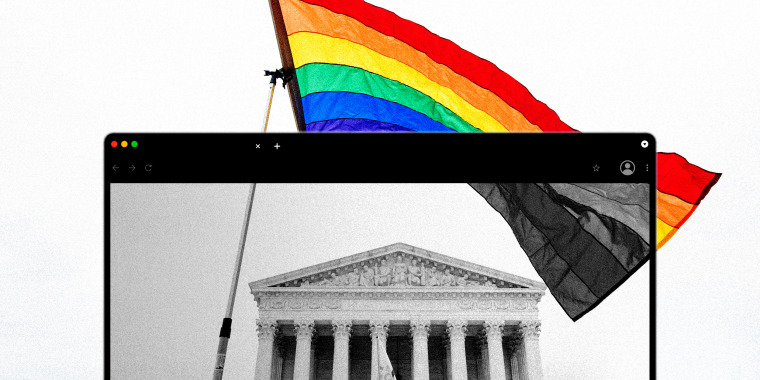A primary issue in 303 Creative v. Elenis, which the Supreme Court heard on Monday, is if a Christian website designer’s refusal to create sites for same-sex couples’ weddings violates Colorado’s public accommodations law by discriminating against those couples based on their status or if it is protected by the First Amendment. So it seemed like an incredible error when the designer’s lawyer admitted, initially, that the designer wouldn’t have a problem making a website for an opposite-sex couple who reject biblical definitions of marriage.
The bottom line is that the case appears to be a foregone conclusion with both Chief Justice John Roberts and Justice Brett Kavanaugh appearing poised to join the other conservatives in a ruling for Smith.
“Yes, she would publish the site,” Kristen Waggoner, the lawyer from the anti-LGBTQ Alliance Defending Freedom, began responding. It was a remarkable moment: Waggoner’s answer would have meant, effectively, that her client, Lorie Smith, was discriminating based on the couple’s status, effectively destroying her legal case.
But, at this Supreme Court, that was not going to stand. Two of Waggoner’s ideological allies on the Supreme Court — Justices Amy Coney Barrett and Neil Gorsuch — stepped up to fix her answer. And that, ultimately, was the real message on Monday — a message the conservative justices have been sending for the past year: Facts and precedent (and what lawyers say, apparently) don’t matter and won’t stand in the way of their ideological, extremist ends.
The whole thing began when Barrett asked a lay-up question to get Waggoner to say that her client’s opposition to making websites for same-sex couples’ weddings was based on the message. Referencing a hypothetical heterosexual couple, Barrett said that what “they want to write under the engagement story page goes like this: We are both cisgender and heterosexual, but that is irrelevant to our relationship which transcends such categories. We knew we were soulmates from the moment that we met and on and on. Would your client publish that site?”
When Waggoner said yes and went on to explain further, Barrett stopped her before she could finish her explanation, asking pointedly, “Even though that narrative, I assume, is inconsistent with her biblical views about marriage?” Later, to make the point even more transparent, Barrett said, “So it’s about the message and not about the sexuality of the couple that asked her to express it that matters?”
With Barrett’s coaching, Waggoner corrected course, saying yes.
Later Gorsuch, too, contended that Waggoner’s initial answer shouldn’t count. Noting, “[J]ust so I make sure I understood your colloquy with Justice Barrett,” he then laid out exactly the position he believed she should take, for his purposes, in the case: “[T]here are certain heterosexual unions that your client would not speak toward either, is that correct?”
“Certainly,” Waggoner replied, referencing facts that were agreed upon by both parties below. (The case is a difficult one to discuss because Smith hasn’t actually started making wedding websites and hasn’t denied any same-sex couples and hasn’t been told by Colorado that she’s violating the law. Instead, she preemptively brought the case, claiming that she fears state enforcement if she did so.)
The exchanges — while illuminating given that Waggoner has long argued these types of cases for ADF, including the Masterpiece Cakeshop case in 2017 — ultimately don’t really matter. What matters are the people who rescued her errant answer and the vote count they represent.
Although Justices Sonia Sotomayor, Elena Kagan and Ketanji Brown Jackson offered up compelling hypotheticals and pushed back against particularly aggressive positions from Justices Samuel Alito and Gorsuch throughout the 2 1/2 hours of arguments, the bottom line is that the case appears to be a foregone conclusion with both Chief Justice John Roberts and Justice Brett Kavanaugh appearing poised to join the other conservatives in a ruling for Smith.
When they were asking about “line-drawing” and “hypotheticals,” they were really talking about consequences.
All of which, however, makes some of the questions asked by the liberals at arguments significant on a different front. When they were asking about “line-drawing” and “hypotheticals,” they were really talking about consequences.
The case is being treated in the press as “a new clash between faith and gay rights,” as The New York Times put it over the weekend, but that’s only what Smith’s lawyers want people to believe. A ruling for Smith is also a ruling that weakens Colorado’s public accommodations law more broadly and, potentially, all manner of nondiscrimination laws.
As Sotomayor put it, “Where’s the line?”
Specifically, she said, “[H]ow about people who don’t believe in interracial marriage or about people who don’t believe that disabled people should get married?”
The best that Waggoner could muster in response was that “it’s highly unlikely that anyone would be serving Black Americans in other capacities but only refusing to do so in an interracial marriage context.”
“Well,” Kagan promptly noted, “it’s not impossible.” Before they could continue, though, Alito jumped in to stop their line of questioning — another save for Waggoner from the conservative justices.
Later, however, Jackson posed a specific hypothetical: Whether a photographer could seek to only take pictures of white children with Santa, all “in sepia tone” to “harken back,” in the photographer’s view, to “the good old days.”
Waggoner initially said that would be different, but, when pressed, admitted, “There are difficult lines to draw, and that may be an edge case.”
In other words, yes, that could be a possibility under the law Waggoner and the conservative justices want to create.
That was the argument on Monday. Now, we wait to see how Alito, Gorsuch and his colleagues put that into writing — and what’s left of our country’s nondiscrimination laws in their wake.
